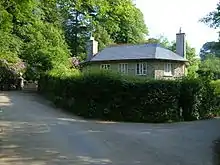Black Hall
Black Hall is a Grade II* listed building near the village of Avonwick, in Devon, England. It was built around 1820, possibly by the London architect R. Brown, for local landowner Hubert Cornish. It is believed that the current building is on the site of an older construction called Blakehall. In 1881 the house was extended by Fredrick James Cornish Bowden who built an additional servants building to the west of the property, consisting of yellow brick with corbelled brick eaves, cornice, and a hipped slate roof. The current building is square in shape and faces south; it is three rooms deep and has two principle state rooms to the front. In the basement, a kitchen and bakehouse are located, as well as the servants hall and dairy which are at ground level at the back of the house due to the sloping elevation. To the front of the building, a five bay façade has been installed with a pillared porch in the centre. The windows are 12-pane sash windows dating from the 19th century, and have wooden shutters on the inside.

The interior of the building boasts a fine oval staircase and hall with a mahogany handrail and balusters, and egg-and-dart mouldings on the walls and ceiling. The stairwell has an elliptical vault and moulded friezes and motifs. The house has a marble fireplace with detailed columns to either side. Another marble fireplace is in the dining room which dates from the Victorian era.
Black Hall was the seat of the Fowells of Fowellscombe Hall which is now in ruins. In 1815 Black Hall was sold to Hubert Cornish who built the present house and landscaped the grounds.
References
- Historic England. "Black Hall (1216358)". National Heritage List for England. Retrieved 28 July 2019.